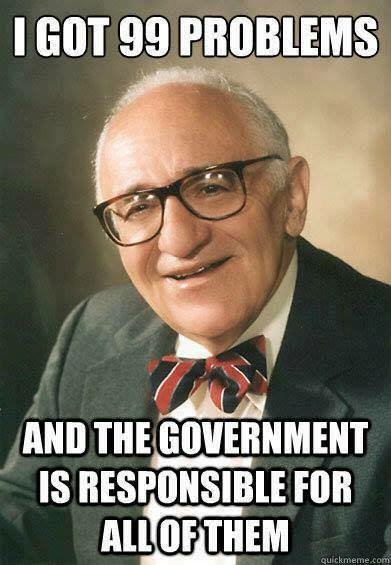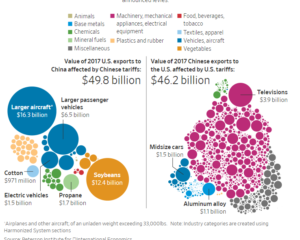News Story of the Day: the March labor data is in…and it’s not really pretty.
According to the Bureau of Economic Analysis (BEA), the national economy added 109,000 jobs, which is less than the estimate of 185,000. The retreat in massive job creation stems from a reversal in construction and retail, two industries that shed jobs, 15,000 and 4,400, respectively. The unemployment rate stood at 4.1 percent for the sixth consecutive month.
The good news for Americans, however, is that wages picked up. Average hourly earnings rose 2.7 percent from the same time a year ago.
Chart of the Day: want a snapshot of what goods are targeted in the U.S.-China trade war? The Wall Street Journal has put together this superb chart that shows what items are facing tariffs:
Illustration of the Day: how many problems do you have? Well, blame the government!

Quote of the Day: the trade war between the United States and China is only beginning. The tariffs are amplifying, the rhetoric is intensifying, and the pain industries are feeling is worsening. Why can’t American officials listen to legendary economist Milton Friedman?
Let us suppose, for a moment, that the Japanese flood us with steel. That will reduce employment in the American steel industry, no doubt. However, it will increase employment elsewhere in America. We will pay for that steel with dollars. What will the Japanese do with the dollars they get for the steel? They aren’t going to burn them. They aren’t going to tear them up. If they would, that would be best of all, because there’s nothing we can produce more cheaply than green pieces of paper. And if they were willing to send us steel, and just take back green pieces of paper, I can’t imagine a better deal!
But they’re not going to do that. They’re not stupid; they’re smart people. They’re going to use those dollars to buy goods and services. They’re going to spend them. In the process of spending them, they may spend them directly in the United States, and that directly provides employment in the United States. They may spend them in Brazil or in Germany or in China or anywhere else. But whoever gets them in turn is going to spend them. So the dollars that we spend for the steel will find their way back to the U.S. as demand for U.S. goods and services. You will have less employment in the steel industry; you will have more employment in the industries producing the goods we export. Overall, total employment will not be affected. But overall, the American consumer will be benefited, because he will get the steel more cheaply, and the goods made from the steel more cheaply, than he otherwise would. That’s the benefit to the American consumer. . . .
You very often bring out the logic of an argument by carrying it to an extreme. You know, you could have a great employment in the city of Logan, Utah, of people growing bananas in hothouses. If we had a high enough tariff on the import of bananas, it could become profitable to build hothouses and grow bananas in those hothouses. That would give employment. Would that be a sensible thing to do? . . .
Now with respect to the charge that the Japanese government is subsidizing the export of steel. Number one, it’s very dubious that it’s true, but suppose it were true. Then that would be a foolish thing for the Japanese to do from their own point of view. But why should we object to their giving us foreign aid?
Tweet of the Day: Kevin Williamson is gone from The Atlantic over “provocative” statements he made on Twitter a few years ago. The magazine likely just wanted to find a reason to can a conservative view from the publication. Well, who should take his place? Charles Murray has an interesting idea!
I’ve always wanted to write for a major magazine. https://t.co/LLzVWLAql4
— Charles Murray (@charlesmurray) April 5, 2018
Video of the Day: the popular thing to say on the left is that the nation needs to elect more minorities, especially blacks, to positions of power. Only then can there be true equality and progress! But does the color of your skin really make a difference? One just needs to look to Africa to see what’s going on there. But within the borders of the United States, there have been many black people, particularly from the Democratic side, who have risen to power and haven’t done anything for the black community. The proposal should just be to reduce the size of government and let people alone.

Leave a Comment